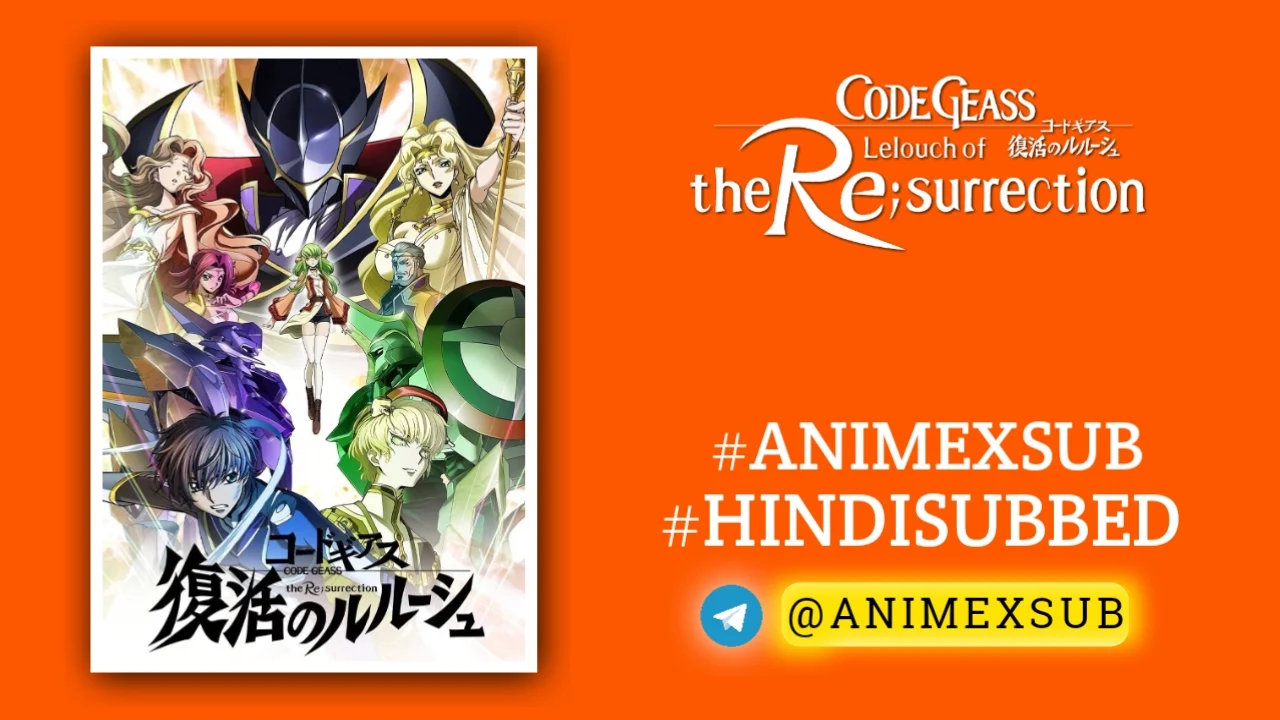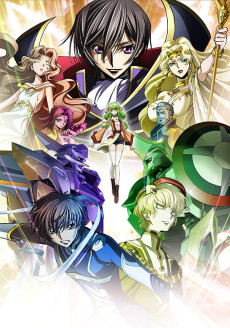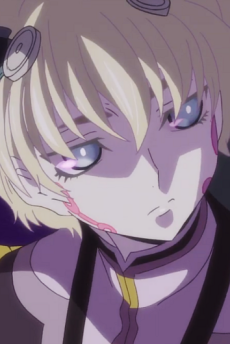
Code Geass: Lelouch of the Re;surrection Hindi Subbed | Code Geass: Fukkatsu no Lelouch Hindi Sub!!

Code Geass: Fukkatsu no Lelouch
Code Geass: Lelouch of the Re;surrectionSynopsis
The story takes place several years after Lelouch's "Zero Requiem" plan. He gave up his life to save the world and protect the ones he loved. The day Lelouch vi Brittannia fell was the day this war-torn world found peace. Now, as his friends work to keep the peace, a terrorist attack could risk everything. Can the brilliant tactician outwit death and save them all? Or will Lelouch’s legacy fall here? (Source: Funimation Films)
🎬 Behind The Scenes
Official Trailer
Main Characters
🔥 If You Loved This...
- 2024 Must-Watch ListJoin thousands of fans discovering the animation-revolutionary anime of 2024 including Code Geass: Fukkatsu no Lelouch!
- Similar Series You'll LoveFind more spectacular anime with the same unbelievable vibe and electrifying character development!
- Action MasterpiecesDiscover more action anime with captivating storytelling just like Code Geass: Fukkatsu no Lelouch!
Code Geass: Lelouch of the Re;surrection – A Resurrection of Ambition, or a Requiem for Restraint?
Code Geass: Lelouch of the Re;surrection (2019), directed by Gorō Taniguchi, is not just a sequel to one of anime’s most iconic series—it’s a bold, divisive experiment that dares to tamper with a near-sacred ending. The original Code Geass: Lelouch of the Rebellion (2006–2008) concluded with the Zero Requiem, a masterstroke of narrative closure that left fans reeling and satisfied. So, when Sunrise announced a sequel film set in an alternate timeline following the recap trilogy (Initiation, Transgression, and Glorification), the question wasn’t just “Can it live up to the original?” but “Why does it exist at all?” This review dives into Re;surrection not as a mere continuation but as a philosophical and structural gamble, exploring its triumphs, flaws, and what it reveals about the enduring allure—and risks—of reviving a finished story.
A New Game Board: The Alternate Timeline Gambit
Re;surrection sidesteps the original series’ canon by anchoring itself to the recap trilogy’s altered timeline, most notably preserving characters like Shirley Fenette, whose death in R2 was a gut-punch. This choice, while controversial, is a deliberate pivot. By setting the film in a “what-if” universe, Taniguchi and writer Ichirō Ōkouchi grant themselves creative freedom to resurrect Lelouch vi Britannia, the chessmaster whose sacrifice defined the original series. The plot kicks off two years after the Zero Requiem, with the world enjoying a fragile peace under Nunnally vi Britannia and Zero (Suzaku Kururugi). This peace is disrupted when Zilkhistan, a mercenary-driven nation, kidnaps Nunnally and Suzaku, prompting C.C. to revive a soulless Lelouch via the mysterious C’s World.
This alternate timeline is both a strength and a stumbling block. It allows Re;surrection to explore new dynamics—like Lelouch’s post-revival psyche and C.C.’s deepened emotional arc—without desecrating the original’s ending. Yet, as reviews on IMDb and MyAnimeList note, the film’s reliance on this timeline alienates newcomers and even some fans, as it assumes familiarity with both the series and the recap films’ changes. The decision to keep Shirley alive, for instance, feels like fan service with minimal payoff, as she appears only briefly, cheapening her original sacrifice without adding meaningful depth.
The Chessmaster’s Return: Lelouch and the Weight of Resurrection
Lelouch’s revival is the film’s emotional and thematic core. C.C., driven by love rather than her usual pragmatism, reconstructs his body and restores his soul via C’s World, a metaphysical realm that remains frustratingly opaque. The film’s explanation of this process— involving Shirley smuggling Lelouch’s corpse and C.C.’s use of an Aramu Gate—leans heavily on Code Geass’s penchant for esoteric mysticism, which may thrill fans but risks feeling like “C’s World bullshit” to skeptics.
What makes Re;surrection unique, however, is its exploration of Lelouch as a man unmoored from his original purpose. In the series, he was defined by his relentless drive to destroy Britannia and protect Nunnally. Here, he’s a resurrected figure grappling with guilt, identity, and the burden of a second chance. Jun Fukuyama’s performance (and Johnny Yong Bosch’s in the English dub) captures this shift, balancing Lelouch’s theatrical “Zero” persona with moments of quiet vulnerability. Yet, as Anime Rants points out, the film spends too little time on Lelouch’s inner turmoil, missing a chance to delve into his guilt over Euphemia’s death or the Zero Requiem’s fallout.
C.C.’s arc, however, is a standout. Her Geass, rooted in her desire to be loved, evolves into a selfless act of reviving Lelouch, not for her own gain but for his ideals. Her confession of love and more “human” demeanor mark a departure from her enigmatic series persona, offering a rare glimpse into her heart. This emotional payoff, paired with Yukana’s nuanced voice work, elevates C.C. beyond the “green-haired waifu” trope, making her the film’s unexpected anchor.
Zilkhistan and Shamna: Villains or Missed Opportunities?
The new antagonists, Zilkhistan’s sibling rulers Shalio and Shamna, introduce a fresh geopolitical angle: a nation whose economy thrives on war struggles in the Zero Requiem’s peaceful world. This concept—peace as a destabilizing force—is intriguing but underdeveloped. Shamna’s Geass, which allows her to rewind time six hours upon death, is a creative twist, enabling her to counter Lelouch’s strategies with near-precognitive precision. However, as multiple reviews note, the siblings lack depth, and their connection to the Geass Order feels forced, failing to match the complexity of villains like Charles or Schneizel. The rushed pacing—50 slow minutes followed by a frenetic climax—further hampers their impact, leaving Zilkhistan as a forgettable footnote rather than a compelling threat.
A Visual and Auditory Feast, But a Narrative Jigsaw
Visually, Re;surrection is a triumph. Studio Sunrise leverages modern animation techniques to deliver fluid Knightmare battles, vibrant colors, and detailed backgrounds that surpass the original series. New Knightmare Frame designs, like those piloted by Kallen and Suzaku, blend nostalgia with innovation, while the film’s traditional animation avoids the CGI overreach that plagues some modern anime. Nakaba Taro’s score, mixing classic Code Geass themes with new tracks, amplifies the emotional stakes, particularly in C.C.’s scenes.
Narratively, however, the film falters. Its two-hour runtime struggles to balance fan-service reunions, action, and new lore. Emotional moments, like Lelouch’s reunions with Kallen and Suzaku, are often undercut by abrupt action sequences or clunky exposition. The film’s climax, involving Shamna’s Geass and a convoluted C’s World scheme, feels haphazard, with even the producer admitting at a screening that the ending confused audiences. This lack of thematic depth—unlike the series’ rich exploration of morality and sacrifice—makes Re;surrection feel like a fun but hollow epilogue.
A Cultural Mirror: Why Re;surrection Matters
Beyond its narrative, Re;surrection reflects the anime industry’s evolving relationship with legacy franchises. Released in 2019, it arrived during a boom in anime sequels and reboots, fueled by streaming platforms like Netflix and a global fanbase hungry for nostalgia. The film’s existence, and Sunrise’s announcement of a 10-year plan for Code Geass content, underscores the pressure to keep iconic series alive, even at the risk of diluting their legacy. Yet, as Anime News Network notes, the alternate timeline allows fans to treat Re;surrection as a “tantalizing ‘what if’” rather than a definitive sequel, preserving the original’s sanctity.
This approach mirrors broader cultural trends: the tension between closure and continuation, seen in everything from Star Wars sequels to Dragon Ball films. Re;surrection doesn’t just resurrect Lelouch; it resurrects the question of whether perfect endings should be left alone. For some fans, the film’s fan-service moments—like Kallen’s heartfelt reunion or Suzaku’s banter with Lelouch—are enough to justify its existence. For others, as seen in scathing IMDb reviews, it’s a “cliché-ridden parody” that overexplains and underdelivers.
The Next Level: A Philosophical Lens
What sets this review apart is its view of Re;surrection as a meditation on resurrection itself—not just Lelouch’s, but the act of reviving a story. In mythology, resurrection often comes at a cost: Orpheus loses Eurydice by looking back; Jesus bears the weight of humanity’s sins. Lelouch’s return carries no such gravitas. His revival, while narratively justified, lacks the moral or psychological reckoning that could have elevated the film. What if Re;surrection had leaned into Lelouch’s guilt, forcing him to confront the lives he destroyed? What if Zilkhistan’s plight had mirrored Lelouch’s own rebellion, creating a parallel that challenged his legacy?
Instead, the film opts for spectacle over substance, a choice that reflects the anime industry’s struggle to balance art and commerce. By framing Re;surrection as a philosophical experiment, we see its flaws not as failures but as symptoms of a larger question: Can a story built on sacrifice endure a sequel? The answer, as Re;surrection suggests, is a cautious “maybe.”
Final Verdict: A Flawed but Fascinating Epilogue
Code Geass: Lelouch of the Re;surrection is a paradox—a film that’s both a love letter to fans and a gamble that doesn’t fully pay off. Its strengths lie in its visuals, C.C.’s arc, and the nostalgic thrill of seeing Lelouch outwit enemies once more. Its weaknesses—rushed pacing, shallow villains, and a lack of thematic depth—make it a shadow of the original’s brilliance. Yet, its alternate timeline ensures it doesn’t ruin Code Geass’s legacy, offering a sandbox for fans to revisit beloved characters without rewriting history.
For newcomers, Re;surrection is inaccessible without the recap trilogy or series context. For fans, it’s a divisive but entertaining ride, best enjoyed as a “what-if” rather than a necessary sequel. With a 7.3/10 IMDb rating and a B from Anime News Network, it’s a solid but not transcendent addition to the franchise. As Sunrise embarks on its 10-year plan, with projects like Code Geass: Rozé of the Recapture (2024) receiving mixed reactions, the question remains: Can Code Geass evolve, or is it forever bound to Lelouch’s shadow?
Rating: 7.5/10 – A visually stunning, emotionally mixed bag that resurrects the spirit of Code Geass but lacks the soul of its predecessor.

























![Animexsub Ϟ A Letter To Momo Hindi Subbed [Full Movie] | Momo E No Tegami Hindi Sub!! 29 Animexsub Ϟ A Letter To Momo Hindi Subbed [Full Movie] | Momo E No Tegami Hindi Sub!! 28](https://www.animexsub.in/wp-content/uploads/2025/08/20250806_234716-by-axs.webp)
![Animexsub Ϟ The Red Ranger Becomes An Adventurer In Another World Hindi Subbed [12/12] | Sentai Red Isekai De Boukensha Ni Naru Hindi Sub!! 31 Animexsub Ϟ The Red Ranger Becomes An Adventurer In Another World Hindi Subbed [12/12] | Sentai Red Isekai De Boukensha Ni Naru Hindi Sub!! 30](https://www.animexsub.in/wp-content/uploads/2025/07/20250704_230206-by-axs.webp)
![Animexsub Ϟ Martial Universe Season 3 Hindi Subbed [12/12] | Wu Dong Qian Kun 3Rd Season Hindi Sub 33 Animexsub Ϟ Martial Universe Season 3 Hindi Subbed [12/12] | Wu Dong Qian Kun 3Rd Season Hindi Sub 32](https://www.animexsub.in/wp-content/uploads/2025/09/20250904_005406-by-axs.webp)
![Animexsub Ϟ Devil May Cry Hindi Subbed [08/08] Series Completed!! 35 Animexsub Ϟ Devil May Cry Hindi Subbed [08/08] Series Completed!! 34](https://www.animexsub.in/wp-content/uploads/2025/06/20250531_225921.webp)

![Animexsub Ϟ Apothecary Diaries Season 2 Hindi Subbed [24/24] | Kusuriya No Hitorigoto 2 Hindi Sub!! 39 Animexsub Ϟ Apothecary Diaries Season 2 Hindi Subbed [24/24] | Kusuriya No Hitorigoto 2 Hindi Sub!! 38](https://www.animexsub.in/wp-content/uploads/2025/06/apothecary-diaries-season-2-hindi-subbed-kusuriya-no-hitorigoto-2nd-season-hindi-sub-by-animexsub-683afb1598295.webp)